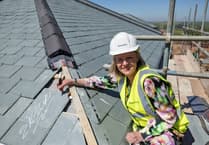Doctors only working on a part time basis has been part-blamed for patients’ difficulty in making quick appointments for non urgent treatment at Dartmouth Medical Practice.
The time it takes to secure a non urgent visit with a GP was one of the key findings of the survey carried out at the end of last year, which 830 people responded to.
Overall, 81% of patients said they were able to get an appointment with a GP, nurse or other clinical staff member on request, but 30% said they had to wait more than two weeks.
Practice partner, Dr Andrew Eynon-Lewis said the number of people able to see a doctor within two weeks was “amazing,” but admitted it is difficult to balance on the day triage – duty doctors making on the day appointments and future booked appointments.
Four or five doctors work at the practice each day, he said.
“When I came to Dartmouth we worked four-and-a-half days a week.
“Now, because of changes in the workforce and possibly the nature of the work, the majority of GPs probably work three days.
“If we didn’t have that option, people possibly wouldn’t work.”
Reporting the survey’s findings, Pierre Landell Mills of the Dart Patients Participation Group said patients experienced “poor continuity of care and follow-up,” along with “insufficient capacity” to address women’s issues and provide mental health support.
Dr Eynon-Lewis said the majority of people who responded to the survey are aged over 65 and that younger people were not so concerned about seeing a doctor of choice.
“I am a great advocate of continuity but we have to balance that with the 613 patients who, when asked about continuity, said either they did see a doctor of their choice or they didn’t mind.
“Many people, in particular working people just want to have their problem sorted and get back on the rails.”
He was “surprised” at concerns about women’s issues and mental health support, adding: “We have a really great bunch of young female doctors and they are all setting up women’s clinics and have women’s health booked sessions.
“It may be we need to publicise them.
“They also have longer gynaecological appoitments so patients don’t feel rushed.
“We also have a very senior mental health worker who works for us part time.
“Mental health resource and expertise has increased but we are still pegging out how to best target that resource.”
The survey also highlighted concern by some elderly patients about using online services.
Dave Crawley, chairman of the patients’ group, said: “The silver surfers are as computer literate as I am and they are using the online service.
“Where you get people that have missed out, they are not going to be able to use it and there is no way around that.”





Comments
This article has no comments yet. Be the first to leave a comment.